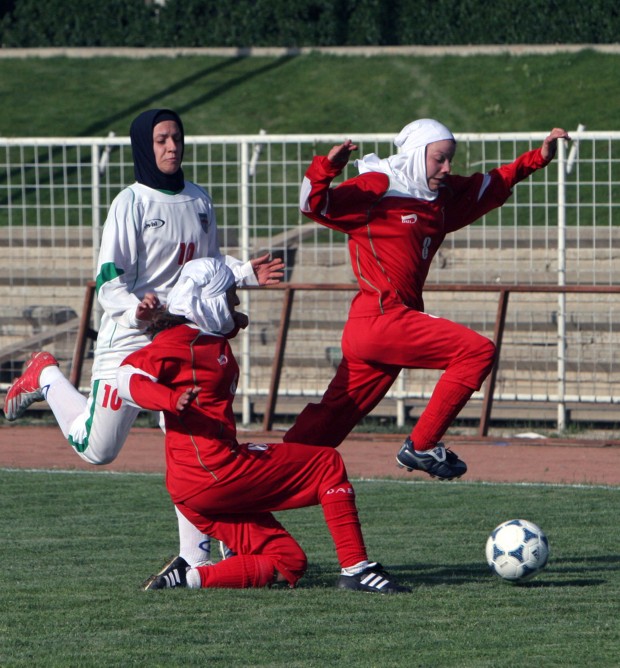Iranian women’s dilemma in sports

Niloufar Ardalan in a friendly match at the Ararat stadium in Tehran, Iran. Iranian womens soccer captain Ardalan reportedly will miss the Asian Cup tournament as her husband has confiscated her passport in a domestic quarrel, according to a report by he Iranian news website fararu.com on Monday, Sept. 16, 2015.(AP Photo)
After the initiative “Watch4Women in Iran” was launched, it managed to highlight Iranian women suffering, especially athletes. It aims to put pressure the International Volleyball Federation (FIVB) to ban Iran from hosting games until they stop banning women. Now, women aren’t only banned from playing but they’re also banned from entering the stadium as spectators.
Iranian authorities have banned women and girls from stadiums hosting football matches for decades, but only recently extended the ban to volleyball—in violation of the principle of gender non-discrimination in sports. According to women inside Iran who are campaigning to attend the matches as spectators, Iranian authorities reneged on promises that they could attend. While security forces took up positions around the stadium, inspected approaching cars at checkpoints, and diverted women away. In flyers, political hardliners compared women spectators in stadiums to “prostitutes.”
Iranian women participation in sports has always been limited to specific sports that doesn’t require removal of hijab in public. Iranian women managed to excel in some sports such as soccer and volleyball. Iran’s female volleyball team was once considered the best in Asia, but due to the lack of female coaches it has been prevented from international competition
But women, whether they were spectators or athletes, face a lot of obstacles trying to keep up with the sport scene in Iran. Last year a British-Iranian woman, Ghoncheh Ghavami, spent nearly five months in jail in Tehran after trying to attend a men’s volleyball match. Ghavami was arrested in June 2014 after taking part in a protest with other activists in front of the Azadi complex, demanding to be allowed to watch a match between Iran and Italy. She has since been released on bail but is barred from leaving the country.
Iran’s female soccer team suffered from these set of rules when they traveled to Malaysia to compete in an indoor soccer championship without their captain. The captain Niloufar Ardalan, 30, is married to sports journalist Mahdi Toutounchi, who under Iranian law has the right to keep his wife from leaving the country. His reason for keeping Ardalan at home, according to reports, is that he did not want Ardalan to miss their 7-year-old son’s first day of school on Sept. 23. The Asian Football Confederation Futsal Championship is set to run from Sept. 21-26.
Ardulan expressed dismay over her husband’s decision and called on the country to revise its laws when it comes to allowing women to leave the country.
Unfortunately, not much has changed in Iran in the last 10 years. Despite promises to ease restrictions, women are still banned from attending men’s sporting events in the country. In some cases, the country has even arrested women who tried to do so, according to the independent.

























































